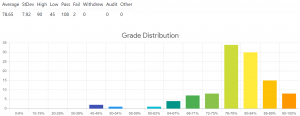Want exposure to all different types of chemistry and their associated lab techniques? If yes, this is the course for you! CHEM 315/335 are courses where you learn the laboratory fundamentals of inorganic, organic, physical, and analytical chemistry!
format of the course
CHEM 315/335 is a course where you have lots of freedom in that you can choose the types of labs you want to do. The lab is a weekly 4-hour block, however I usually found myself leaving on average at the 3 hour mark. The reason I’m discussing both 315 and 335 at the same time, is because these are the exact same courses, with 335 being the continuation of 315 (you still choose from the same set of experiments – just the ones you haven’t done yet).
how to choose your experiments
As I mentioned earlier, there is four types of chemistry experiments you can choose from. CHOOSE THEM WISELY!
My favorite type of experiments by far were the inorganic ones. The pre-lab quizzes were super easy (and worth 1/4 of your lab mark)! They took 5 minutes to complete and consisted of 5 multiple choice questions testing you on oxidation numbers and chemical disposal. The labs are interesting and the most stress-free. In fact, I managed to finish the inorganic labs 1.5-2 hours almost every time.
The organic chemistry labs were my second favorite. The pre-lab quizzes were long, but most of the concepts were stuff from second year organic chemistry (around 30 mins-1 hour of pre-lab prep was suffice). I found these labs to be more stressful, because you are expected to know almost everything that is going on upon reading the lab instructions. This isn’t entirely unfair, as CHEM 203/245 (prerequisites) were both organic labs – so you are expected to have the fundamentals down. I’ve never finished early for these labs.
The analytical chemistry labs weren’t hard, but they were INTENSELY stressful. The pre-lab quizzes were much harder than the organic and inorganic ones – I often spent 2-3 hours just trying to understand the lab instructions. Half of your laboratory mark hinges on the accuracy of your results, so there’s absolutely no room for error in terms of technique. Your results also will vary on the helpfulness of your TA, especially for the experiments where you’ve never operated the lab equipment before.
The physical chemistry labs were the WORST. The pre-lab quizzes were unnecessarily difficult, it took me many hours to prepare for those. The lab instructions felt like they were written in another language (telling us to self-learn difficult concepts with no prior exposure and then performing an experiment that applies these concepts is asking a bit too much). In my opinion, these labs need a do-over to make them more student-friendly for those that aren’t familiar with physical chemistry. Avoid these labs at all cost!
GPA 🙂 or 🙁
This course is more of a GPA equalizer. There’s a high average, but the standard deviation is tight and it’s only worth 1 credit. Your GPA in the course is also largely dependent on your experiment selection. General rule of thumb: Avoid labs with lab reports AND AVOID THE PHYSICAL CHEMISTRY LABS (I would rather do a lab with a lab report than these). There’s also no final exam/midterms. Here’s the grade distribution from 2018 winter.

CHEM 335 grade distribution. Credits: ubcgrades.com
Verdict: To take or not to take
If you want to gain more lab skills, definitely take this course. It’s not very time consuming and will only take up 5-6 hours of your week 😀
